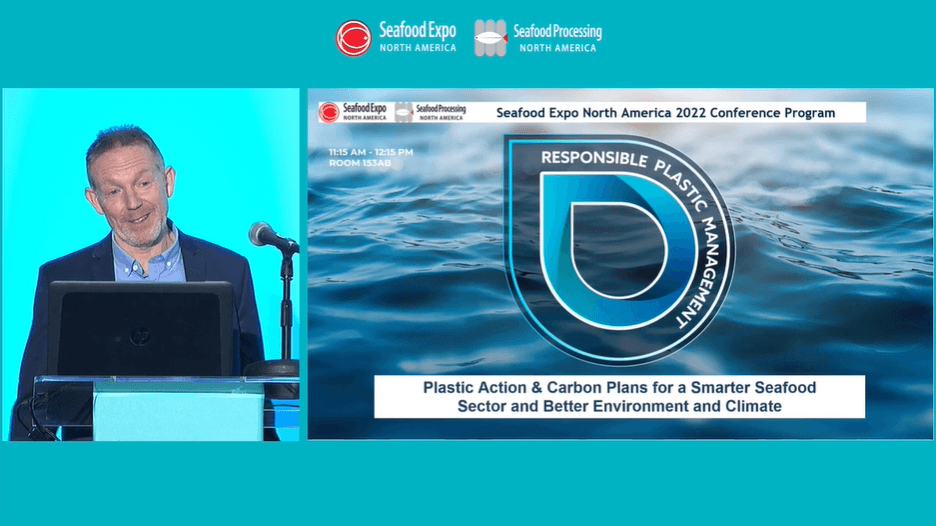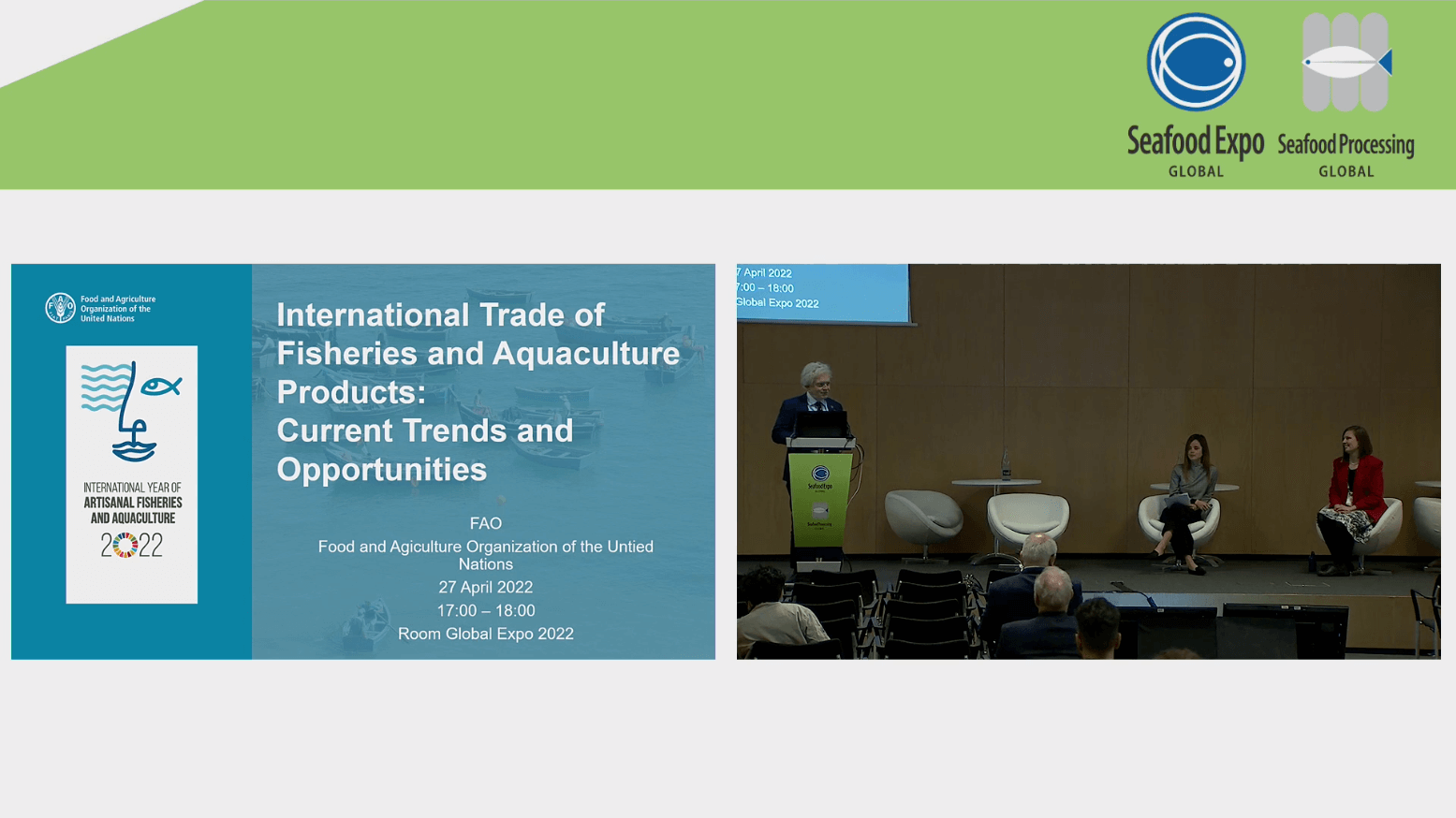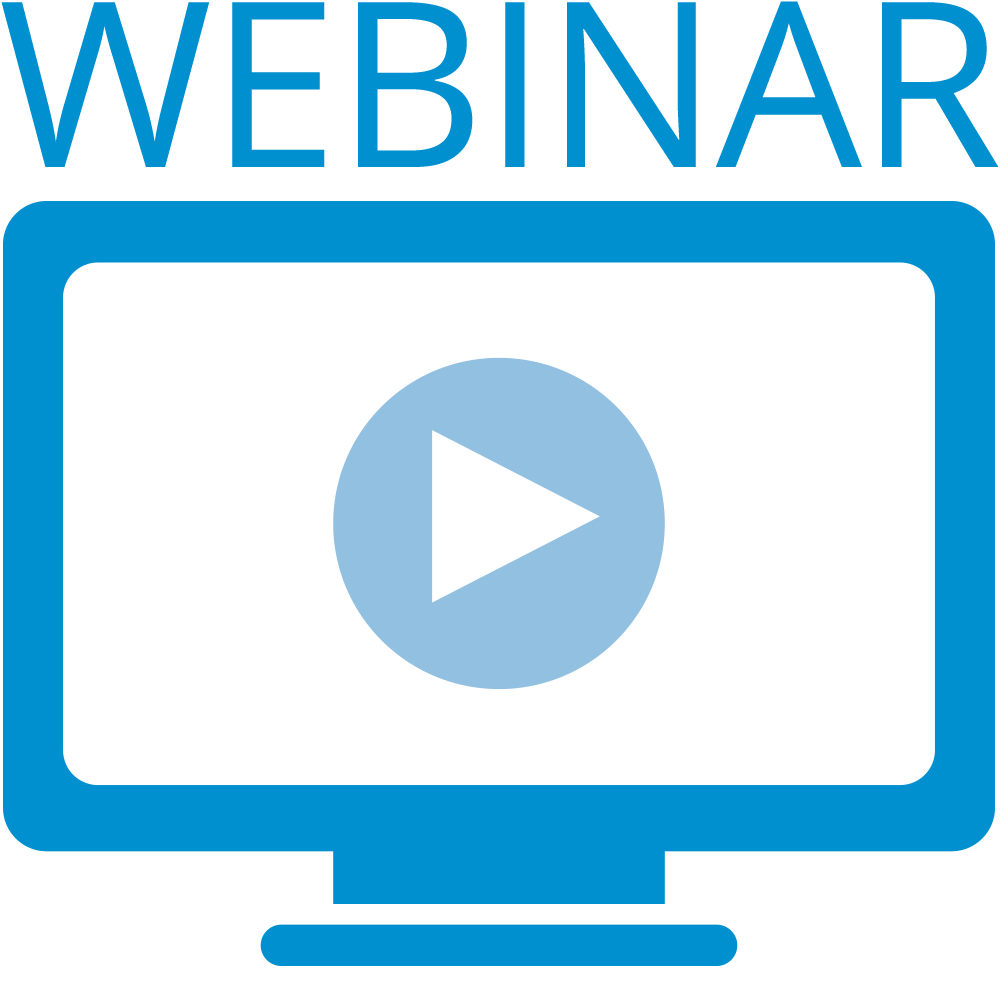Filters
Product Categories
Moderator: Dave Garforth, The Responsible Plastic Management Program CIC
Speakers: Joel Baziuk, Global Ghost Gear Initiative C/o Ocean Conservancy
Peter Marshall, Responsible Plastic Management Program
Plastic is an essential component used extensively throughout the global seafood industry. From nets, floats, pens, boxes, tubs, bags, liners, clothing, PPE, belts, walls, floors, even boats. It assists with catch efficiency, design innovation, durability of infrastructure and equipment, seafood product protection, insulation and prevention of food waste and much more. Unquestionably the most important material we have ever possessed. But few can ignore the negative impact of global plastic mismanagement on the environment and on climate change. Plastic mismanagement after use has caused a pollution crisis and a call on more virgin plastic to be produced. The production and destruction of global plastic accounts for 56 billion tons of greenhouse gas emissions. Plastic management must be integrated into organizations sustainability and carbon reduction action plans and frameworks for better business and a better environment. Plastic is made almost entirely from fossil fuel which means it has a significant carbon footprint. But at the same time, it can offer significant advantages in comparison to other materials and, used correctly and managed responsibly, can offer significant carbon reduction advantages. However, we have sufficient information and tools to make these comparisons and ensure we make better choices. A global shift in the way the industry uses plastic could bring about a substantial contribution to carbon reduction (reducing virgin plastics) and GHG emissions and seafood plastics needs to be included in the equation to reverse climate impact and the loss in nature.
However, we are only just starting to unravel the seafood plastic footprint and adding the extra dimension of mapping the seafood plastic carbon footprint will be a challenging endeavor, particularly if corporates and businesses must go it alone. Key questions arise. What are the full considerations and the extent of this double mapping task? What are the significant contributions to plastic footprints and what are the significant actions that reduce both plastic impacts and carbon emissions…and whilst maintaining viable businesses and importantly, ensure seafood continues to contribute to global food security? What are the policy implications and conflicts (e.g., food packaging legislation versus recycled content), what are the required economies of scale for collection and recycling, what are the infrastructural requirements and what are technology gaps need to be addressed?
This session identifies how this can be achieved. The panel will be managed by the Responsible Plastic Management Program and the speakers are experts in the field of Plastic Management and Sustainability Frameworks. Mapping plastic use, life cycle, end fate and leakage from the global seafood sector is an emerging activity and forming part of the seafood ESG agenda but is a very recent endeavor. What has yet to emerge, are the facts of if, how and to what extent a reduced seafood plastic footprint contributes to a reduced carbon footprint. The Responsible Plastic Management Program is a not-for-profit global assurance and improvement initiative for organizations seeking to engage with a responsible plastic management strategy. The RPM Program is engaged with over 15 industry sectors and works across key plastic driven initiatives.

Attendees will learn how consumer and healthcare provider surveys guided the development of www.seafoodhealthfacts.org, along with what the site has to offer. Attendees will also learn how the theme "Framing the Message" came about and what the new road map is for guiding consumers along the path of optimal seafood consumption.

More and more seafood operations on both the fisheries and farmed side are seeking sustainability and the credentials that go with it, intent on establishing their products as socially and environmentally responsible. This journey toward sustainability often leads to some familiar places, including to the doors of renowned certification bodies such as the Marine Stewardship Council (MSC) and the Aquaculture Stewardship Council (ASC). When it comes to sustainability certification, MSC and ASC have seen most everything – join Nicolas Guichoux, the global commercial director at MSC, Esther Luiten, the senior commercial manager for ASC, and SeafoodSource in a discussion of the modern trials and trends facing the seafood industry in the realms of sustainability and certification.

Speaker(s)/Moderator(s):
John Goodlad, Chairman, Scottish Pelagic Sustainability Group
Sean Murphy, Editor, SeafoodSource.com
Duration: 29 minutes


Speakers: Audun Lem, Deputy Director, Fisheries and Aquaculture Division - FAO, Giulia Loi Food Safety Advisor - FAO, Christine Rolin, Ms/Aquaculture Specialist - FAO, Mariana Toussaint, Fishery Expert - FAO
Fisheries and aquaculture products are currently the most traded animal protein worldwide in value terms. The associated industry is also characterized by a wide range of product types and participants, making trade global, diverse, and complex. In recent decades, the fisheries and aquaculture sectors expanded significantly with an increase in overall production, trade and consumption.
The FAO Session will present a general outlook of international trade of fisheries and aquaculture products. It will also explain the causes of import notifications of fisheries and aquaculture products at the main importing markets, and present an overview of seaweed and microalgae in global aquaculture development.

New, 1-Year Master’s in Ocean Food Systems from UNE

Cell-cultured Seafood: How BlueNalu went from small startup to attracting mainstream funding

During this FREE 30-minute webinar, Seafood consultant Joseph Sabbagh will briefly discuss key findings from the report, Chinese Seafood Consumers: A Survey of Retail-Purchasing Behaviors. This interactive webinar will allow you to ask questions and determine your significance as a distributor or retailer in the Chinese seafood market.

Dr. Mike Fabinyi, a Senior Research Fellow at the University of Technology Sydney, will present the results of ongoing research on Chinese seafood consumption. Mike’s research is based on interviews and surveys with seafood restaurant operators, traders and consumers in China over several years. It assesses changing patterns of seafood consumption, the factors affecting these changes, and attitudes, practices and governance initiatives relating to environmental sustainability in this market.





